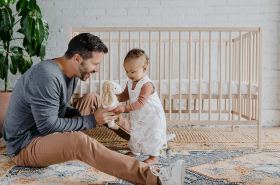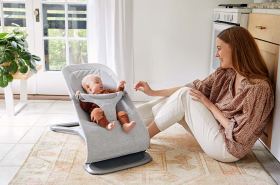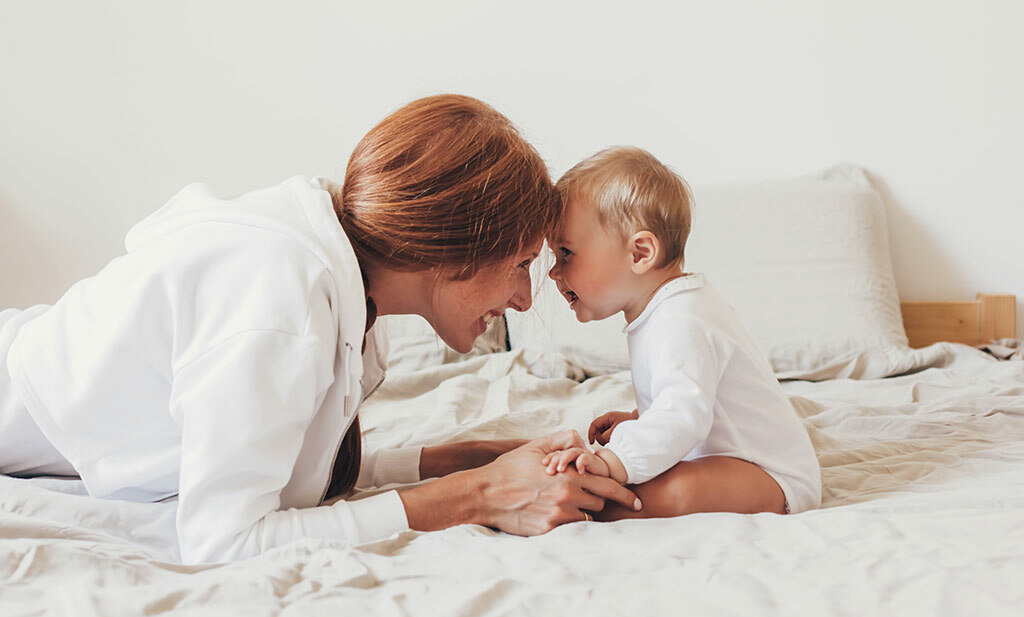
Moving around is fun! Whether it’s from back to tummy, turning around on your tummy or crawling around the room – your baby loves to move. Especially once they learn to crawl, probably by the end of their 7th month. They are eager to play with a wide variety of toys and are approaching their next milestone on the way to walking upright. This is because the 8-month-old baby milestones include sitting at an angle.
Most babies have mastered this by the end of their eighth month, so that they can continue to move upwards. And don’t worry if your little one is not quite ready at this stage. Every baby has their own pace and develops at different speeds. However, if they aren’t yet able to turn from their back to their tummy by the end of the eighth month, this is a good reason to consult your paediatrician.
In addition to reaching the milestone of “sitting on an angle”, there are other baby development steps that you can observe at the end of the eighth month. Our expert and midwife Katrin Ritter explains exactly what these are in the eighth part of our blog series “Baby’s developmental milestones with Ergobaby: baby’s first year”.
8-month-old baby milestones: the milestone of sitting at an angle and other baby milestones
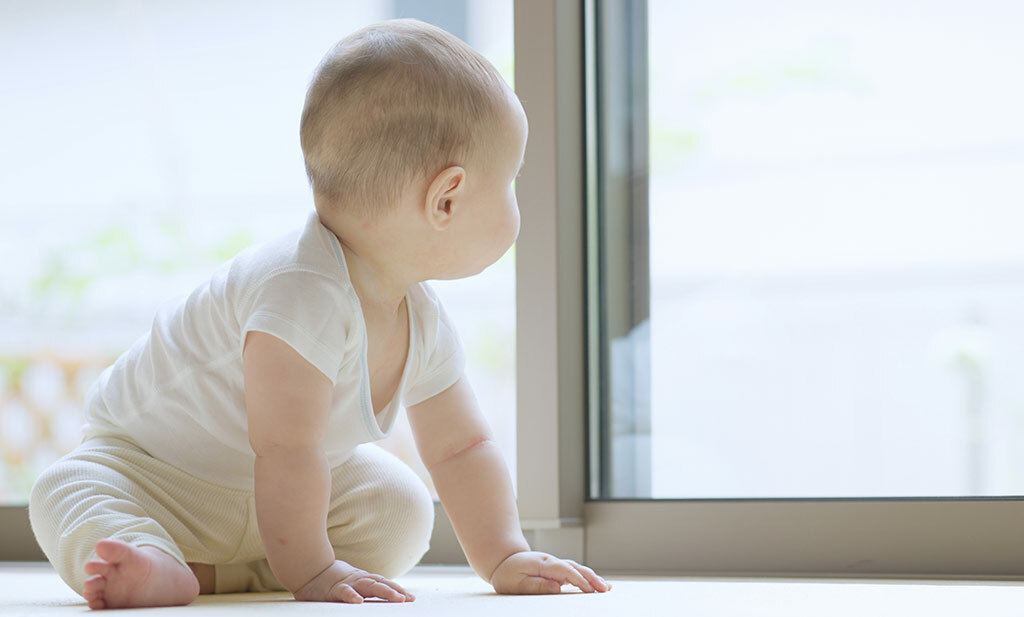
Angled seat
The time has come. Around the end of the eighth month, your little one will probably adopt a kind of sitting position on their own for the very first time in their exciting life so far – the ‘angled seat’. Whilst your baby may have been pushing and propping themselves up when turning from a prone to a supine position and back again (from their tummy to their back), they are now moving into more of a seated position t. This is where they sit at an angle, leaning forwards, propped up on a hand or two. It is the intermediate step between lying down and sitting upright, i.e. the basic position for all further steps towards the upright position and therefore also crawling. The hands are free to discover and look at objects and toys.
But how does your baby get into the ‘angled seat’ position and how can you support your little one? Many babies initially go onto their hands and knees, . then bring their pelvis sideways to the floor and put weight on their bottom. Et voilà, they’re in an ‘angled seat’ .
You can also support this baby development step by letting your little one go onto their hands and knees over your outstretched leg – when you yourself are sitting on the floor. Your baby can then sit sideways on their bottom and interact and play with you from the ‘angled seat’.
Immature long seat
As a direct result of the ‘angled seat’, your baby will gradually move into the immature and later the mature ‘long seat’. You will notice that your little one turns their upper body slightly away from the supporting hand of the ‘angled seat’ and stretches their legs out in front of them. In the immature long sit, however, the legs are still turned inwards or outwards a little too much and his pelvis and spine are still too bent. But the hands are free in the long sit – whether mature or immature – and are both ready to curiously discover and “grasp” the world and all toys.
By the way: if your little one has not yet reached the mature ‘long seat’ on their own, i.e. they aren’t yet able to sit down on their own with legs straight and spine relatively upright, you should not place them in this position. Baby’s body and muscles are simply not ready yet and it can have an impact on their physical health.

Crawling preparation
We have already mentioned this: Your baby wants to move around and explore the whole room, indeed the whole world. And by the end of the eighth month, it does. While readiness for the crawl has been well prepared in the seventh month, it is now being put to use. From the prone position (on their tummy), baby uses the alternating single elbow support to move towards the object of its desire. The legs alternately push off from the base. Wow, it’s fun and your little one will become faster and more confident.
Hands and knees
The baby development steps so far are not enough for your little one. It wants to move upwards, as we have already seen with the inclined sit, but also with the dwarf sit and elbow support. That’s why, in the eighth month, the four-footed position continues to be practiced diligently. From the prone position, for example, you can move up one level as described above for the diagonal sit: symmetrical hand support, hip joints stretched, abdominal and hip flexor muscles tensed and raised. You can support your little one in this position by holding their pelvis with both hands and rocking it slightly back and forth. This will help your baby gain more and more confidence in the hands and knees position. You can also put your baby in this position on a large exercise ball – well secured, of course. If they like it, you can slowly roll the ball back and forth. Later on, when they have mastered the ‘angled seat’, this is often the starting point for crawling.
Crawling preparation
No matter how clean you are at home, your baby will come across the odd piece of fluff or crumb. We already talked about this in the last part of our blog series. While this was previously picked up with the help of the immature tweezer grip, the fingertips may now slowly but surely start to touch precisely. Initially, the thumb and side index finger may still touch, but eventually the thumb and tip will meet. This means that your baby’s grasp is becoming more and more precise and their fine motor skills continue to develop. By the way, did you know that the pincer grasp distinguishes us from all other mammals? Only monkeys can do it.
With this small grip, not only are the fingers used more and more specifically, but also the hands become more and more conscious, precise and versatile. Another 8-month-old baby milestone. Suddenly your little one can reach for objects with both hands and hold them at the same time. Previously, this was always a problem. If he had a toy in one hand and wanted to reach for another with the other, the first hand would open and the object would fall down. These times should slowly but surely be over.
Object permanence: Further development of short-term memory
If you hide a toy under a blanket or behind a pillow at the end of the eighth month, baby will discover it in no time at all. This is because your little one’s short-term memory is developing. This also means that you can go into another room for a brief moment without immediately raising the alarm. Your baby now knows that you are still there even if they can’t see you. Their fear of abandonment should diminish somewhat.
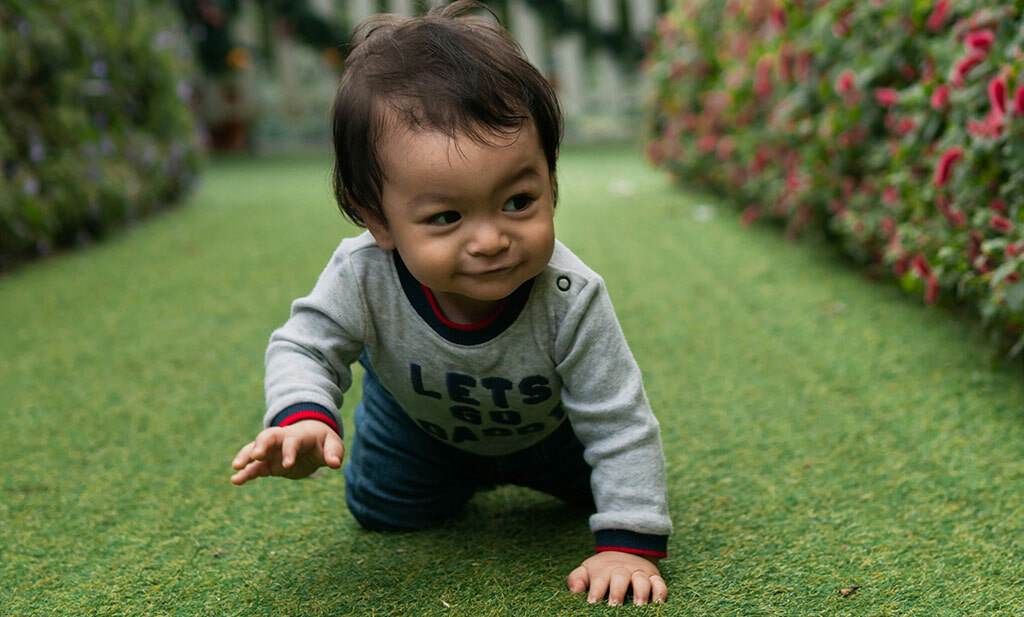
8-month-old baby milestones: they’re nearly on the move!
Things are slowly but surely moving upwards as we work through the 8-month-old baby milestones. Your baby wants to get upright. And so it will soon be pulling itself up above the knee on furniture and objects. We hope you have attached all the cupboards, chests of drawers and shelves to the walls. If not, please, do it now. The ‘angled seat’ is a big milestone that also makes it easier for your little one to reach up higher. You can encourage this by continuing to hand them toys from this direction. In this way, they will train their balance and muscles more and more on the way to sitting upright. And horizontal movement will also increase soon. And then things will really get going. We’re excited to share what’s in store for you and your baby in month nine. The next episode of our blog series “Baby’s developmental milestones with Ergobaby: baby’s first year” will follow next month.
—————————————-
Source: Babys in Bewegung, Kienzle-Müller, Wilke-Kaltenbach, Urban & Fischer, 4. Auflage

